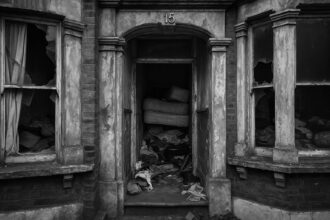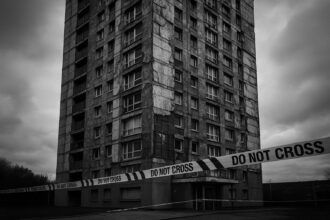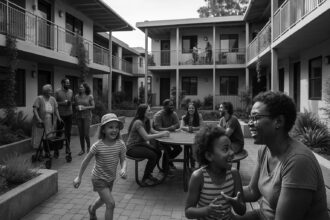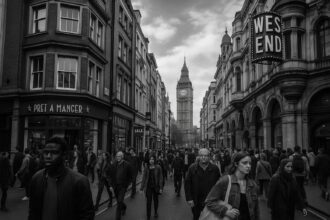A makeshift camp housing Roma migrants in London’s affluent Park Lane has ignited debate over public safety and compassion, as authorities grapple with legal protections, residents’ rights, and community calls for urgent intervention.
The emergence of a makeshift migrant camp in the heart of London’s Park Lane, a prominent thoroughfare known for its affluence, has sparked significant public discourse around issues of migration, homelessness, and local governance. Compromising the region’s prestige, the camp, reportedly housing members of a Roma community, has drawn attention due to reports of unsanitary conditions and public disorder. Witnesses have described scenes that range from the mundane—residents cooking meals and hanging up laundry—to the distressing, including instances of public defecation.
This encampment has created a complex landscape for local authorities and residents alike. The individuals situated there claim to have arrived in the UK after traversing multiple European countries, including Italy and France. One resident, Diana, shared her harrowing journey, which saw her pay £2,000 to travel from Libya to the UK, encountering significant hardships along the way. “We don’t steal because it brings trouble. We beg,” she stated, asserting that all members of the camp were actively seeking employment as cleaners despite their lack of formal residency and language barriers.
The camp’s location, mere steps away from high-end hotels and restaurants, situates it as an anomaly amidst luxury, intensifying the tensions over homelessness and public safety. Local residents have expressed frustration, pushing for action from authorities, particularly concerning the growing number of those living in discomfort on public land.
Historically, similar encampments have sparked mixed responses from authorities. Previous clearances have faced legal challenges posed by human rights considerations, which protect individuals’ rights to shelter—even when that shelter consists of tents. For instance, a 2020 encampment in nearby Mayfair endured prolonged occupancy owing to such legal constraints, and calls for stricter immigration measures arose as community leaders sought remedies for what they described as organised criminal behaviour linked to migrant begging.
As recently as late 2024, Transport for London (TfL) received a possession order from the Central London County Court, highlighting the ongoing tension between humanitarian considerations and the urgent need for public safety. TfL has emphasised that Park Lane, given its central location and heavy traffic, is not a safe environment for rough sleeping. The local council reiterated this sentiment, acknowledging the sophisticated matrix of needs that contributes to homelessness, affirming their commitment to finding a long-term solution compatible with the rights of those displaced.
The dynamic interaction between the council, police, and the local community underscores a broader debate about migration policy and its ramifications for urban living in one of the world’s leading cities. Many are left questioning the balance of compassion and security, wondering what effective measures can be employed to restore order without deepening the plight of the vulnerable.
While some might advocate for harsher responses to informal settlements, the focus must inevitably rest on understanding the systemic causes behind such migrations and the socio-economic realities that render some individuals homeless in the first place. As discussions continue, the residents of the Park Lane encampment remain, alongside calls from the community for urgent action and a sustainable resolution to an increasingly visible crisis.
Reference Map
- Paragraph 1: [1]
- Paragraph 2: [1], [2], [3]
- Paragraph 3: [1], [4], [5]
- Paragraph 4: [2], [6], [7]
- Paragraph 5: [1], [2], [3]
Source: Noah Wire Services
- https://www.express.co.uk/news/uk/2055779/migrant-camp-fury-park-lane – Please view link – unable to able to access data
- https://www.standard.co.uk/news/london/park-lane-hyde-park-homeless-camp-transport-for-london-westminster-city-council-b1189408.html – In October 2024, a homeless encampment in Park Lane, London, was dismantled by Transport for London (TfL) and Westminster City Council. The camp, located near Hyde Park, had been a concern due to safety issues for rough sleepers. TfL stated that the area was not a safe place for people to sleep rough and emphasized the importance of the safety and welfare of everyone involved. The council and its partners worked to clear the site and ensure the welfare of those displaced.
- https://www.bbc.com/news/articles/cql3pq055xlo – In September 2024, Transport for London (TfL) took legal action to clear a strip of land in Park Lane, London, occupied by homeless individuals. TfL was granted a possession order by the Central London County Court, stating that Park Lane was not a safe place for people to sleep rough. The encampment consisted of about 15 tents and items like tables and shopping trolleys. TfL emphasized the safety and welfare of everyone involved and planned to follow the next stages of the legal process to gain possession of the site.
- https://www.standard.co.uk/news/crime/police-raid-park-lane-romanians-camp-and-bus-20-off-to-airport-for-free-flight-home-8720069.html – In July 2013, police and immigration officials conducted a dawn raid to dismantle a makeshift camp of Romanian travelers in Park Lane, London. Over 50 officers confiscated bedding and escorted residents to a mobile police station. A total of 63 Roma travelers were detained and questioned by immigration enforcement officers. Twenty individuals accepted free flights home and were escorted to Heathrow Airport. The camp had been a source of complaints from residents and businesses due to issues like petty crime, begging, and anti-social behavior.
- https://www.telegraph.co.uk/news/2020/12/12/priti-patel-urged-help-powerless-council-dealing-mayfair-brothel/ – In December 2020, Westminster City Council faced challenges in dismantling a homeless encampment in Mayfair, London, due to legal constraints. The encampment, established for seven years, attracted mainly Roma Gypsy families from Romania. The council and police had limited powers to remove tents because the Human Rights Act protected individuals’ right to privacy in their homes, including tents. The council leader urged the Home Secretary to strengthen immigration laws to deport professional migrant beggars and address organized criminal gangs smuggling people to the UK.
- https://www.mylondon.news/news/zone-1-news/growing-park-lane-homeless-encampment-29841878 – In August 2024, Transport for London (TfL) was granted a possession order for land in Park Lane, London, occupied by a growing homeless encampment. The area, located in the middle of the dual carriageway near Hyde Park, was deemed unsafe for rough sleepers. Estimates indicated that at least 40 people were living on the site, with tents, tables, shopping trolleys, and washing airers present. TfL emphasized the safety and welfare of everyone involved and planned to follow the next stages of the legal process to gain possession of the site.
- https://www.telegraph.co.uk/news/2024/08/30/sadiq-khan-delay-homeless-tent-city-mayfair/ – In August 2024, it was reported that a homeless ‘tent city’ in Mayfair, London, remained for six months before action was taken. Dozens of people had set up camp on a green space near Park Lane, close to luxury establishments. Transport for London (TfL) sought a possession order for the area, stating that Park Lane was not a safe place for people to sleep rough. The delay in eviction raised questions about potential political motivations, as the action was taken after a Labour government was elected.
Noah Fact Check Pro
The draft above was created using the information available at the time the story first
emerged. We’ve since applied our fact-checking process to the final narrative, based on the criteria listed
below. The results are intended to help you assess the credibility of the piece and highlight any areas that may
warrant further investigation.
Freshness check
Score:
8
Notes:
The narrative references recent events and ongoing issues in London, suggesting it is current. However, without specific dates or events that can be verified as recent, the score is not perfect.
Quotes check
Score:
6
Notes:
The quote from Diana, a resident of the camp, does not have an easily verifiable online source. This could indicate it is original or not widely reported.
Source reliability
Score:
5
Notes:
The narrative originates from a well-known but sometimes sensationalist publication. While it reports factual events, the presentation can be biased.
Plausability check
Score:
8
Notes:
The claims about migrant camps and public responses are plausible given London’s history with similar issues. However, specific details about individuals’ journeys could not be verified.
Overall assessment
Verdict (FAIL, OPEN, PASS): OPEN
Confidence (LOW, MEDIUM, HIGH): MEDIUM
Summary:
The narrative’s freshness and plausibility are reasonable, but specific details, especially quotes, lack clear verification. The source, while known, may sensationalise events, impacting reliability.













